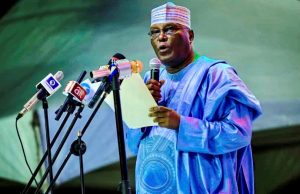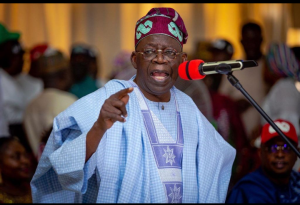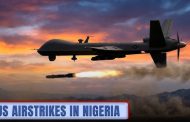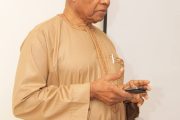Asiwaju Ahmed Bola Tinubu, the presidential candidate of the All Progressives Congress, (APC) is, unlike Atiku Abubakar, his counterpart from the People’s Democratic Party, (PDP) obviously having problem picking his Vice-President material. The matter is serious enough for an Intervention editorial, with particular reference to the paradigm from where he can start and sail safely.
The belief that Nigeria cannot be such a populous and materially wealthy African country without an elevated purpose of being a force for good may be no more than a logical inference but nevertheless a fascinating inference. So also is the belief that Nigeria cannot operationalize that self as long as it is locked in self-vandalisation at the domestic front. The conclusion which becomes compelling from these two impressive inferences is the imperative for Nigeria to get itself out of the culture of endless inter-group suspicion, ethno-religious acrimony in particular and the several other wars of attrition.

Luckier than his APC counterpart in terms of choosing a running mate!
Against the above, there is what we in this platform would call the mood of Nigeria at this point in time that makes it not to be a case of chauvinism to argue for balance in the religious identity of the impending first and second citizens. Rather, that balance has become a requirement for re-assembling Nigeria itself. It is a matter of dealing with the checkmate character of the Christians – Muslims interface in Nigeria which has made it impossible to ignore the balancing act in the composition of government. The situation is worsened by the absence of popularly rooted political parties whose members subscribe to an overarching value that would have diminished identity differences.
To make matters worse, the world itself has become enveloped in the multicultural contention that no one can represent anyone because we do not all experience the world from the same prism. In Nigeria, this makes the idea of a Muslim – Muslim ticket a weak arrangement as to become dangerous to stick to Senator Orji Kalu’s pragmatism, for example, that such a ticket is in tandem with the logic of the end justifying the means. This is because the means employed could even destroy the end at the end of the day.
The point about balance in representation when you have a multicultural polity is neither about statistics nor about competence. It is simply about “they too”. Otherwise, why would the Americans have bothered about voting for a Barack Obama and making him a president? How many African-Americans are there in the United States when compared to other cultural groups, statistically and otherwise?
 This is the sense in which the Muslim North has absolutely nothing to lose in a Christian Vice-President to Tinubu in an election in which, as it is today, the president is most likely to be a Muslim. A Christian Vice-President takes away absolutely nothing from the Muslim North at this point in time when seen from the point of view of national re-imagination and more peaceful co-existence as a requirement for the unfolding of Nigeria as Africa’s core state. The way Intervention sees it, the current state of endless suspicion, wrangling and acrimony serves nobody’s interests anymore. There are millions of Nigerians who worry more about the ideological consciousness rather than the religious identity of high state officials. But, a combination of factors has privileged religious identity over ideological consciousness to a point of making religious balance a condition for stability. This is what the Machiavellianism of Muslim – Muslim ticket ignores.
This is the sense in which the Muslim North has absolutely nothing to lose in a Christian Vice-President to Tinubu in an election in which, as it is today, the president is most likely to be a Muslim. A Christian Vice-President takes away absolutely nothing from the Muslim North at this point in time when seen from the point of view of national re-imagination and more peaceful co-existence as a requirement for the unfolding of Nigeria as Africa’s core state. The way Intervention sees it, the current state of endless suspicion, wrangling and acrimony serves nobody’s interests anymore. There are millions of Nigerians who worry more about the ideological consciousness rather than the religious identity of high state officials. But, a combination of factors has privileged religious identity over ideological consciousness to a point of making religious balance a condition for stability. This is what the Machiavellianism of Muslim – Muslim ticket ignores.
There is no doubt about it that the Christian North has not been that lucky of late to be the identity roots of individuals who have penetrated other cultural groups or regions as to project power on a national scale in the same manner as the Bola Tinubus, for instance, are doing. The very few who have done this such as General TY Danjuma or Bishop Mathew Hassan Kukah are not politicians in the traditional sense of the word. Senator George Akume is generally framed to be generous, accessible and populist but, in contrast to Tinubu, again for the purpose of an example, he has yet to project power on a national scale. It may not be unconnected with his cultural minority identity in the context of Nigeria. Of course, it is a sociologically established point that it is much easier for a actors from majority ethnic groups to unfold on a national scale in a complex polity as Nigeria. Senator David Mark has unfolded but he is a product of a national institution – the Nigerian Army. It must interest students of politics that, outside of the army, he has not permeated Nigeria as to be a signifier in the same force as an Atiku Abubakar or a Tinubu even though he has been the longest Senate president in Nigerian history. Of course, there are those who would say that David Mark’s problem is that he is just not a politician but, whichever is a more scientific explanation for this phenomenon, the long and short of it is that the Christian North is in search of a JS Tarka all over again. This is in the sense of the one who could penetrate the Northeast, the Southwest and back to the North, depending on what is at stake
To this extent, it is not out of place to sympathise with Asiwaju Tinubu on finding a contextually good fit Vice-Presidential candidate. As true as it that Atiku Abubakar of the PDP might not be having it easy deciding his Vice-Presidential candidate either, he is not confronting a religious dimension to choosing his second-in-command as in the case of Asiwaju Tinubu of the APC. The Asiwaju’s case is made more complicated by the threat that a colorless, track-record -lacking Christian Northerner will pose to his struggle for power. Getting that crack politician of Christian identity with a singularity that can overwhelm all other deformities in terms of possible victory is not going to be a tea party, especially if he is compelled to follow ancient wisdom. Only imaginativeness may save the ticket.
Intervention decries the unfortunate fact that terminologies such as Christian or Muslim Northerner and so on are terminologies Nigerian politics must still confront at the current level of intellectual, cultural and even material development of the Nigerian totality. The only cure for it is rapid industrialisation, irrespective of who can make it happen.
In the context of a rising youthquake against control of the political space by elements they consider to be nothing but a buccaneering gerontocracy, it is not advisable to tie the transition to options that could produce stalemate. At the least, let the elections go ahead. Let whoever win be sworn-in and let nobody create situations that makes life even more difficult for those who must go to the streets or the market every day in order not to starve to death. What Dr. Goodluck Jonathan has, in the characteristic complexity of language use, taught in Nigerian politics is that nobody’s ambition should be a justification for conditions that could lead to all-involving stalemates.




























